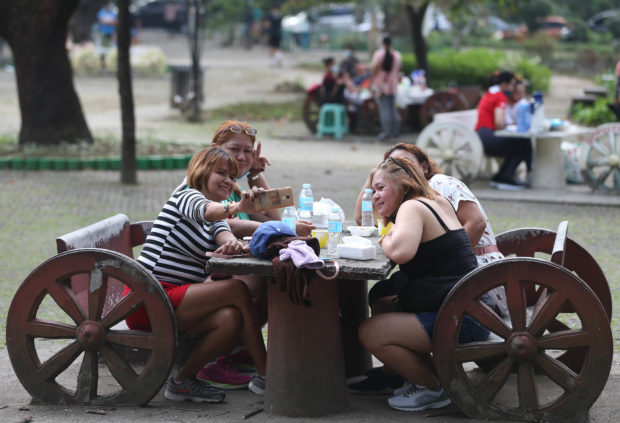Too early to recommend easing quarantine restrictions — health experts

RELAXATION A group of friends enjoys a Sunday morning picnic at Quezon Memorial Circle in Quezon City as officials and medical experts differ on whether to relax coronavirus curbs throughout the country. —NIÑO JESUS ORBETA
Health experts on Sunday cautioned the government against easing to the lowest level coronavirus curbs throughout the country, especially in Metro Manila, after an independent research group last week reported a slight upward trend in COVID-19 cases in the metropolis, with a variant of the virus possibly causing the spike.
Metro Manila and much of the country are under strict general community quarantine, but the National Economic and Development Authority (Neda) has recommended downgrading the curbs to modified general community quarantine to allow the reopening of up to 95 percent of the economy and pull the country out of recession caused by the coronavirus pandemic.
The 17 mayors of Metro Manila have also voted to ease the restrictions, but decided to allow only people 15 to 65 years old to go out. They have recommended the change to the Inter-Agency Task Force for the Management of Emerging Infectious Diseases and President Duterte is expected to announce his decision on Monday.
Vaccinations first
But the independent OCTA Research Group that advises the government on the coronavirus response believes the step is premature.
At the minimum, Dr. Guido David of OCTA said health-care and other front-line workers with active public interaction, like police and security guards, must be vaccinated first.
Article continues after this advertisementNot a single health-care worker in the Philippines has received the COVID-19 vaccine yet, as paperwork has delayed deliveries of vaccines from the procurement pool Covax and from China.
Article continues after this advertisement“It is too early at this point. New variants [of the coronavirus have been] detected and we don’t know yet the extent of [their] presence, [while] our cases have not gone down to less than 1,000 [daily],” said Dr. Rontgene Solante, an infectious disease expert at San Lazaro Hospital in Manila.
“It looks premature to relax [the restrictions]. From the public health perspective, study [the proposal] more carefully,” David said.
David said the researchers respected the decision of the Metro mayors, but local lockdowns were difficult in the metropolis because the cities were “interconnected and people move around easily.”
But in other areas with a lower risk of a case surge, like Batangas province, easing the quarantine is possible to boost economic activity, David said.
Keeping the restrictions in place in the metropolis gives the mayors “more control” to arrest an outbreak, he said.
2,400 new cases a day
Last week, OCTA warned that new coronavirus infections in Metro Manila could increase to more than 2,400 a day by late March if the restrictions were lifted prematurely.
Healthcare Professionals Alliance Against COVID-19 (HPAAC) maintains that protective measures and a population able to protect itself must be in place before the government eases the restrictions.
“It shouldn’t be a case of black and white, close or open, but the question must be, ‘Are we ready?’” said Dr. Antonio Dans, spokesperson for HPAAC.
He said HPAAC last week met with Transportation Secretary Arthur Tugade to discuss better public transportation and the opening of more bike lanes in the city.
The group also advocates for leisure in open-air places like parks rather than reopening closed commercial places like movie houses and shopping malls.
Dans said the group would send a letter to Malacañang on Monday to lobby for an executive order that would allow internet providers access to satellite connection.
“Businesses, [people] working from home, education, and even for [the] health [sector] to improve contact tracing… we need a better internet connection [before] we open up,” he said.
Restoration of production
But Acting Socioeconomic Planning Secretary Karl Kendrick Chua insisted on Sunday that placing the entire country on modified general community quarantine would bring back nearly all the economic activities that existed before the pandemic struck last year.
The pandemic forced the government to place the country on hard lockdown, preventing an explosion of coronavirus infections but stopping 75 percent of the economy. The result was a contraction of 9.5 percent, the worst performance of the country’s economy in decades.
Chua, who also heads Neda, proposes freeing more public transport and lowering age restriction to complement the restoration of production.
Children, according to him, were a major consumption driver before the pandemic, as most families dined out or shopped with kids in tow.
But his predecessor, former socioeconomic planning chief Ernesto Pernia, objects to full-country easing of curbs.
“For me, [it] should be selective. It shouldn’t be imposed in all areas,” Pernia said in a television interview on Sunday.
“There are still high-risk areas. The restrictions should be kept in place in these areas,” he said.
—With reports from Ben O. de Vera and Katrina Hallare
For more news about the novel coronavirus click here.
What you need to know about Coronavirus.
For more information on COVID-19, call the DOH Hotline: (02) 86517800 local 1149/1150.
The Inquirer Foundation supports our healthcare frontliners and is still accepting cash donations to be deposited at Banco de Oro (BDO) current account #007960018860 or donate through PayMaya using this link.